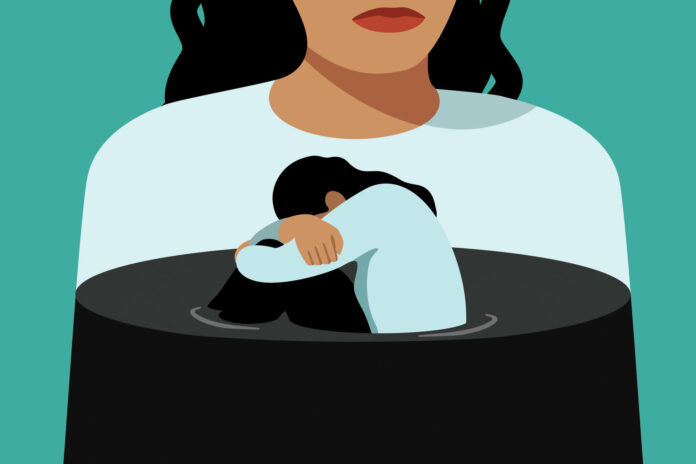If you are a parent or a sibling to a teenager, you might be familiar with silence or vague responses whenever you try to make a conversation, a tendency to sleep throughout the day until you intervene, or excessive exposure to screens which even cut down the face-to-face time with the loved ones. Considering the hormonal changes, most teens display these behaviours, which is pretty common. But, consistent and abrupt changes in mood could be a sign of depression.
According to the World Health Organisation (WHO), one in seven 10-19 years old experiences a mental disorder, including depression, globally. And in the UK alone, the rates of probable mental disorders in people aged 17 to 19 rose from 10.1% in 2017 to 17.7% in 2018. Also, drug use is more prevalent among people with mental health disorders. In other words, depression and addiction go hand in hand.
Yet, some parents fail to identify the early signs of depression in their children and, thus, miss the opportunity to provide support. However, if you’ve noticed symptoms of depression in your child on most days for over a week or two, they might be developing depression. Luckily, there are ways to support your teenager and even prevent the development of depression.
This article will zoom in on teenage depression, the possible symptoms, and ways to prevent it.
What is Teenage Depression?
Depression is a severe mental health illness that negatively affects how a person feels, thinks, or acts. Likewise, teenage depression cause persistent sadness in children and makes them lose interest in various activities, daily or recreational. In the worst cases, depression also causes physical, emotional, and functional problems. Though there is no control over the development of a mental health disorder in anyone’s life, it is essential to note that the symptoms of depression are different in teenagers and adults. Also, issues like academic expectations, body changes, and peer pressure bring several ups and downs for teenagers. However, the downsides are severe. For instance, dual diagnosis is common in teenagers. It means they may develop substance use disorder or addiction due to depression.
Furthermore, teenage depression isn’t a weakness someone can overcome using willpower. Instead, it needs attention and requires long-term treatment. For example, while some teenagers benefit from medical assistance, others need a therapist or psychologist.
Symptoms of Teenage Depression
Any change in the previous behaviours of teenagers either at school, home, in socialisation, or other areas of life can be counted as the symptoms of teenage depression. Here, the symptoms are divided into emotional and behavioural changes to get a closer outlook.
Emotional Changes: Emotional changes or symptoms of depression may include sadness, such as crying spells for no apparent cause, hopelessness or emptiness, an irritable mood, anger or frustration even over minor matters, and loss of interest in hobbies. Some teenagers may also experience family conflicts, low self-esteem, self-blame, self-criticism, guilt or worthlessness, fixation on past failures, and extreme sensitivity to loss. Other signs to watch out for in teenagers are trouble thinking, remembering things, excessive reassurance, making decisions, concentrating, and frequent suicidal thoughts.
Behavioural Changes: The other category of depressive symptoms among teenagers constitutes behavioural changes, which might include insomnia or too much sleep, weight gain, tiredness or loss of energy, use of alcohol or drugs, decreased appetite, increased cravings for food, and agitation or restlessness. Behavioural changes also constitute social isolation, slowed-down thinking, speaking, and body movements, poor performance, frequent absences from school, less attention to appearance and personal hygiene, frequent complaints of unexplained body pains and headaches, self-harm like cutting, angry outbursts, and suicide attempts.
Ways to Prevent Teenage Depression
Depression is a mental health disorder that you shouldn’t take for granted. Even if the symptoms are few or occur rarely, you must take preventive measures to combat them. Here are some of the effective ways to support your teen in preventing depression:
1. Love Your Teen Unconditionally
There is no doubt that the adolescence period is the most crucial one in children’s life. For example, the relationship between you and your child is fragile, and they tend to display a rebellious attitude. Hence, fostering an honest and open relationship is paramount in their lives. In addition, you must give your teenager a feeling that you will always be there when they need you. A few ways to do that include:
- Praising their achievements.
- Setting aside time every day to talk.
- Offering positive affirmation.
- Motivating them.
- Responding to your child’s anger with calmness.
2. Monitor their Screen Time
Social media use is becoming popular among teenagers with every passing minute. Therefore, you must be strict about their social media use or screen time. You might have seen teenagers using social media applications excessively and getting lost in the moment, which is not psychologically nourishing. Start encouraging them to have personal interactions with others instead of letting them scroll through social media throughout the day.
3. Foster Friendships and Social Networks
Another pre-emptive measure that you can take to prevent your child from depression is to help them foster healthy friendships. For example, instead of prohibiting them from visiting their friends’ birthday parties or sleepovers, do the opposite. Reaffirm them they can spend time with friends within a limit rather than going all overboard. Because in the teenage period, children are trying to know themselves better, being able to find a company in others is common. Also, positive peer connection help prevents depression.
4. Promote Healthy Sleeping Routine
Sleeping problems or insomnia are also leading causes of depression in teenagers. Hence, you must practice your child to sleep and wake up at the same time regularly. If sleeping is the problem, ask them to limit their screen time right before bed or remove distractions like television or computer from their room.
5. Foster an Active Lifestyle
Any physical activity produces endorphins, the hormones responsible for positive feelings. Therefore, exercising or planning a dedicated workout routine can help teenagers improve their mental health. Also, it doesn’t have to be miles of running or cycling every time; simply walking or taking a stroll in the park can help.
6. Consult with a Therapist
Without worrying about the stigma attached to consulting a psychologist or therapist to deal with depression, reach out to them for guided support. Going to a psychologist is not always the reason for mental illness; however, it is one of the ways to prevent the illness from actually transpiring.
When to See a Doctor
While the ways mentioned above open the door for you to prevent depression, it is best to visit the doctor if the symptoms worsen. Seeing a psychologist or therapist is a great place to begin if your teenager behaves slightly strangely or is moody. It is because the depression symptoms will not improve on their own, and they worsen if left untreated. For example, in the worst-case scenario, teenagers might start drinking or using drugs or develop suicidal thoughts. However, depression and addiction develop quite easily, and you may have to reach out to a therapist specialising in treating dual diagnosis. Don’t wait to seek support if you find your teenager on the verge of developing a mental health disorder.

















